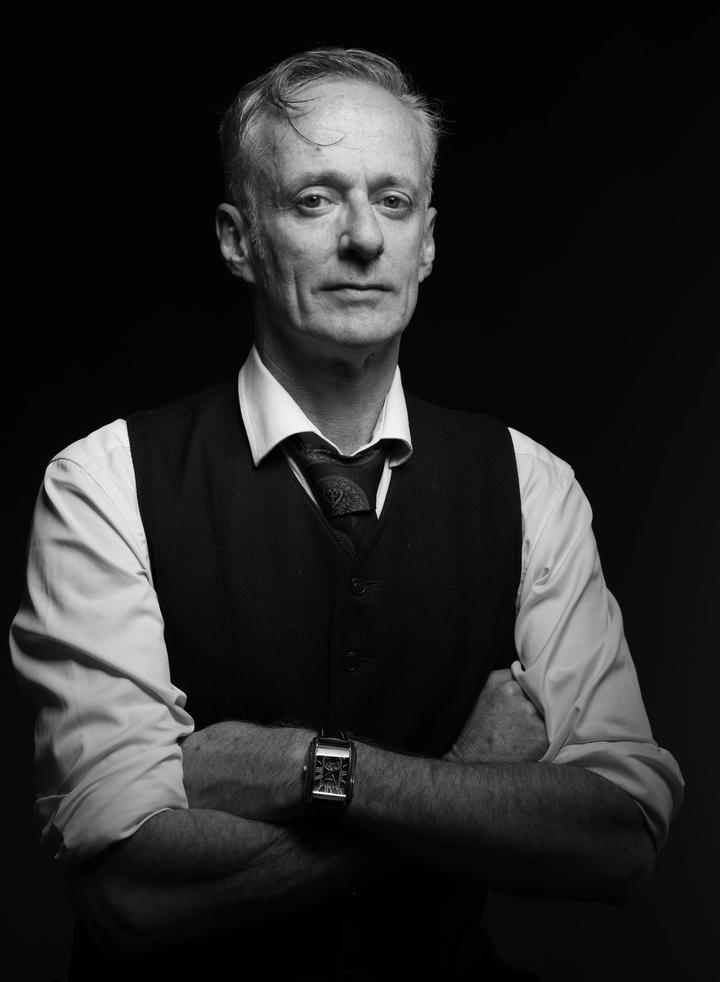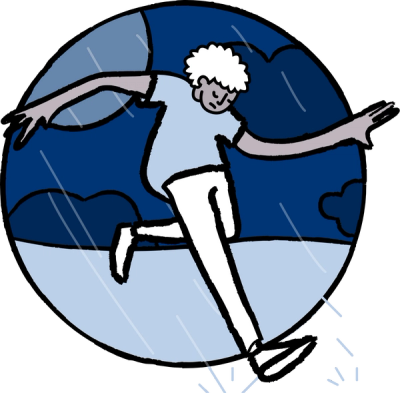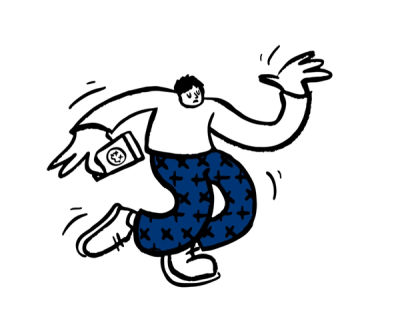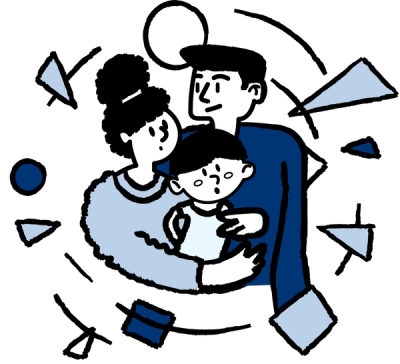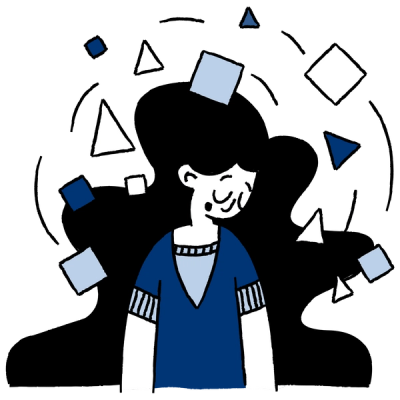Overwhelmed by grief, past trauma, and thoughts of suicide, he turned to Lifeline, which these conversations became a vital source of comfort and connection when he needed it most. Through persistence, therapy, meditation, and the discipline of martial arts, Dominic rebuilt his life step by step. Today, he speaks openly about his journey, reminding us that while darkness can feel overwhelming, there is always a path forward.
Read the transcript
Dominic:
[00:00:00] This overrated brain, this very overrated organ, it thinks, 'no, I'll just muscle through this.'
[00:00:06] 'I can do it. I can do this on my own.'
[00:00:08] 'No, I don't want to.'
[00:00:10] 'I don't want to call somebody' or 'no, that's embarrassing.'
Narrator/Announcer:
[00:00:13] Welcome to Holding on to Hope, a series that shares the stories of everyday Australians that have experienced moments in crisis and found a path to support.
[00:00:22] Whilst all of the stories shared offer hope and inspiration, at times you may hear something you find triggering.
[00:00:28] If you or someone you know needs crisis support, please phone Lifeline on 13 11 14, text 0477 13 11 14, or visit lifeline.org.au for Lifeline chat service, which is 24/7.
Carla (Host):
[00:00:45] Hi, I'm Carla and welcome to this episode of Holding on to Hope.
[00:00:50] At 49, Dominic's life took an unexpected turn when he experienced a severe mental health crisis, just as he was about to become a father.
[00:00:59] Struggling with overwhelming darkness, he found himself suicidal, calling Lifeline multiple times.
[00:01:05] Those calls became his lifeline, providing the hope and connection he desperately needed.
[00:01:10] Today, Dominic has rebuilt his life, finding strength through therapy, meditation and personal growth.
[00:01:17] He's here to share his journey from rock bottom to resilience and to remind us that even in our darkest moments, hope is always within reach.
[00:01:26] Dominic, wonderful to have you here.
[00:01:27] We're going to talk about your experiences of mental health over your life.
[00:01:32] Can you take us back to the first time you realized you were struggling with mental health?
Dominic:
[00:01:39] When I used Lifeline the most was that time when after losing my wife and son through a really terrible mental health crisis, I think there was a lot of postnatal depression there and there was a lot of historical abuse in my life as a child and I was in real trouble.
[00:02:08] So I started calling, I think someone mentioned to me, you can call Lifeline.
Carla (Host):
[00:02:11] And so what did that period look like and feel like for you?
[00:02:16] You've talked about experiencing postnatal depression for yourself.
[00:02:21] What did it look like?
Dominic:
[00:02:23] It's hard to talk about.
[00:02:27] The past abuse as a child from multiple perpetrators, including someone very significant in my life, I won't say who it is, but you can imagine, the chief male in my life had caused me to get very fused to some darkness and it's like that darkness just became alive and was eating me alive.
[00:02:49] And I was seeing a counselor who sadly wasn't very challenging and I just felt myself starting to get backed into a corner by my demons.
[00:03:03] It's the only way I can put it.
[00:03:04] I don't mean that in a kind of religious way.
[00:03:07] I just mean my own dark past.
[00:03:11] Hug your demons or they'll bite you in the ass is what the Yankees say.
[00:03:15] And they were biting me in the ass.
[00:03:18] They really were.
[00:03:19] Yeah.
[00:03:19] Yeah.
Carla (Host):
[00:03:20] And how long had that been going on for you?
Dominic:
[00:03:23] Five years, maybe.
Carla (Host):
[00:03:25] So a long time.
Dominic:
[00:03:26] Yeah.
[00:03:27] I then realized when I'd lost them, I started to think that I was going to lose everything.
[00:03:34] And then I became, that suicidal ideation kicked in and I went up to Sydney Harbour Bridge.
Carla (Host):
[00:03:43] And you mentioned there was someone there who walked up and said, are you okay?
Dominic:
[00:03:47] Oh, yeah.
[00:03:48] Lance.
[00:03:49] I'll never forget this man.
[00:03:50] It's not, I don't remember him so much.
[00:03:52] I just remember his energy.
[00:03:53] He said, are you okay?
[00:03:55] And I said, no.
[00:03:56] I think I just shook my head.
[00:03:58] And he said, you know, I lost my wife and child.
[00:04:01] And 13 years later, that child turned up at my front doorstep.
[00:04:05] All these things he said to me, unbidden.
[00:04:07] I hadn't said anything to him.
[00:04:08] And he walked me down to the bottom of the stairs and he said, I'll see you later.
[00:04:15] And the cops turned up and they looked me up and down and they put me in 72 hours.
[00:04:21] I was in the 72 hours at psychiatric emergency psychiatric care at Royal North Shore.
Carla (Host):
[00:04:26] And somewhere along the line, someone said, you can call Lifeline.
[00:04:30] What was that first call like?
[00:04:32] What was going on for you?
[00:04:34] What made you pick up the phone and ring in?
Dominic:
[00:04:38] Oh, I was desperate.
[00:04:39] I was so desperate just for human contact.
[00:04:44] Maybe I was desperate to try and make sense of it a bit on a sort of analytical level, make sense of it.
[00:04:49] And then also just to desperate to find some humanity and someone to connect to.
[00:04:55] And they were amazing.
[00:04:57] They were amazing.
[00:04:58] I think I was often crying on the phone with them and there was often a sense of relief having reached out.
Carla (Host):
[00:05:08] To get to the point of needing to reach out or being able to reach out, what was the hurdles for you to get to that point?
Dominic:
[00:00:00] This overrated brain, this very overrated organ, it thinks, 'no, I'll just muscle through this.'
[00:00:06] 'I can do this on my own.'
[00:00:08] 'No, I don't want to.'
[00:00:10] 'I don't want to call somebody'
[00:05:27] No, no, I'm going to muscle through this.
[00:05:31] I'll make a piece of toast.
[00:05:32] I'll be all right.
[00:05:34] Or, no, that's embarrassing.
[00:05:36] Or, I feel ashamed.
Carla (Host):
[00:05:38] So the experience of ringing Lifeline, what was going on in those calls?
[00:05:44] What was the experience like?
[00:05:46] What did you come away with?
Dominic:
[00:05:48] I'd often, they'd say, they have a phrase, I can't remember what it is.
[00:05:52] How are you?
[00:05:53] Or what's going on for you today or something?
Carla (Host):
[00:05:55] What's happening for you today?
Dominic:
[00:05:57] What's happening for you today?
[00:05:58] I think that's their phrase, yeah.
[00:06:00] And just that tone of their voice, I'd be in tears generally, that connecting with that person.
[00:06:06] Yeah.
[00:06:06] I mean, the pragmatics of the calls are almost irrelevant.
[00:06:09] Again, I think it's very much, it's my belief that that reaching out, that courage, and it is, it's a courageous step.
[00:06:16] Totally agree.
[00:06:17] It's totally scary.
[00:06:19] But that reaching out to another person, they often say at the end, so what are you going to do for yourself?
[00:06:26] Is there something you can do nice for yourself?
[00:06:28] Or is there something constructive you can do?
[00:06:30] Or what's on your plate for the next few hours?
[00:06:32] Yeah.
[00:06:32] So they'll bring it down to now.
Carla (Host):
[00:06:34] Yeah.
Dominic:
[00:06:34] Because that whole suicidal stuff is past or future ideation.
[00:06:39] It's all about what a disaster my life is or I can't go forward because what happened in the past.
[00:06:45] All that stuff is, it's past and future.
[00:06:48] It's not now.
[00:06:48] None of it's now.
Carla (Host):
[00:06:49] And even if what you're going to do now is literally sitting there, patting the cat or.
Dominic:
[00:06:55] That's right.
[00:06:55] Getting some food, having a shower.
[00:06:57] Yeah.
[00:06:58] Doing some shopping, calling up a friend for coffee, whatever it is.
[00:07:03] Yeah.
[00:07:04] That's right.
[00:07:05] Looking after your needs.
Carla (Host):
[00:07:07] And a bit of distraction to.
[00:07:09] Yeah.
[00:07:09] Even if it's for half an hour or 10 minutes or.
Dominic:
[00:07:13] That's right.
Narrator/Announcer:
[00:07:15] We hope you're enjoying this episode.
[00:07:17] Lifeline's new support toolkit makes it easier to care for family, friends and loved ones.
[00:07:23] And look after yourself along the way.
[00:07:26] Visit us at toolkit.lifeline.org.au.
[00:07:29] Now back to the episode.
Carla (Host):
[00:07:31] So meditation is something you've used as a strategy.
[00:07:35] What brought you to that?
[00:07:37] How are you using it?
[00:07:39] Can you tell us a bit more about that?
Dominic:
[00:07:40] So if you think about the analogy of the iceberg and we see about 10% or 9%, I think someone postulated in people when we meet them.
[00:07:47] And there's that other 81% or 91% floating around.
[00:07:52] And so the meditation taps you into or me into that 91%.
[00:07:57] The intangible, extraordinarily wonderful gift that is life.
[00:08:06] Because I had some.
[00:08:07] This morning I had some nervousness about doing this interview.
[00:08:09] And my brain with nerves will go, what's this?
[00:08:14] I'm nervous.
[00:08:15] Okay.
[00:08:16] What's going to happen?
[00:08:18] And I have catastrophic thinking.
[00:08:22] My brain goes, life's not very good.
[00:08:24] And I go, really?
[00:08:26] I have to challenge my brain sometimes.
[00:08:29] One of my clients calls her brain an angry chihuahua.
[00:08:31] And my brain can be very determined to try and take me down.
[00:08:38] There's part of my brain that wants to take me down.
[00:08:40] It wants to annihilate or destroy or be hopeless.
[00:08:44] And when you meditate, when I meditate, I do it twice a day now, sometimes three times if I'm struggling.
[00:08:52] There's something called the Soul Sync Meditation.
[00:08:54] It's non-profit.
[00:08:55] It's just this 16 minutes.
[00:08:57] It's on YouTube.
[00:08:58] It is phenomenal.
[00:09:00] It's just a guided meditation.
[00:09:01] You sit there for 16 minutes.
[00:09:04] And I think, oh, what's this going to do?
[00:09:05] And some days I resist it.
[00:09:07] And I don't get to do the morning one, so I do the afternoon one.
[00:09:11] Meditation grounds me.
[00:09:12] It gets me out of my catastrophic thinking.
[00:09:15] It gets me out of hopelessness.
[00:09:17] It reminds me of how wonderful life is.
[00:09:19] I can feel my body in the chair.
[00:09:21] I can feel my breath.
[00:09:22] And it's not the anxiety is gone.
[00:09:24] It's just that you're processing it differently.
[00:09:27] You're processing the anxiety differently.
[00:09:30] So it doesn't become all-encompassing.
[00:09:31] Because if you focus on the problem, it becomes huge.
[00:09:35] Hence panic attacks or whatever's going on.
[00:09:37] So the meditation takes you down, down, down, down, down and out of that.
[00:09:40] And so it was the call.
[00:09:41] It's the same with the call.
[00:09:41] It takes me out of that overly self-introverted state, which we all can get into.
Carla (Host):
[00:09:49] Martial arts is also something in your toolbox.
[00:09:52] How has that helped you?
[00:09:54] What role does it play?
Dominic:
[00:09:55] I saw some Aikido being demonstrated.
[00:09:58] Aikido.
[00:09:59] I thought, what's that?
[00:10:00] And I went and saw this demonstration.
[00:10:01] I thought, wow, that's the actor's medium.
[00:10:04] Head, heart, center.
[00:10:06] I did two free classes and I thought, I can't do this.
[00:10:09] I've got to go to acting school.
[00:10:11] And that was 1989.
[00:10:14] So I was auditioning for these acting schools, which was hard to get into.
[00:10:17] Three or 4,000 people.
[00:10:18] Wow.
[00:10:19] They take about 20 people.
[00:10:20] Wow.
[00:10:21] And it was purely on audition and the interview.
[00:10:23] Purely.
[00:10:24] Nothing else.
[00:10:25] Nothing academic.
[00:10:26] It's just purely your audition.
[00:10:28] I eventually got in after auditioning.
[00:10:32] Ten years later, 1998, I moved in.
[00:10:35] I divorced.
[00:10:35] I was living on my own in a one-bedroom, like a studio apartment.
[00:10:40] It was fantastic.
[00:10:42] You clean it in a few minutes.
[00:10:44] And then I saw this thing on a post and I tore it off.
[00:10:47] And, yeah, martial arts is, the meditation and the martial arts is a powerful paradigm for good or enduring mental health.
[00:11:01] Because I think there's, even to psychologists and psychiatrists and everybody who deals with the mind and humanity, it is such a can of worms.
Carla (Host):
[00:11:10] And you've opened that by studying counselling, working as a counsellor.
[00:11:14] How is it being there in the worms?
Dominic:
[00:11:16] Being in the worms is, it's profoundly beautiful because you're helping people find hope.
[00:11:26] You really are, in the end.
[00:11:29] You can't do it for them.
[00:11:31] You can't give them advice.
[00:11:33] You can mentor them.
[00:11:35] I mean, there was a five-fold increase in the need of counsellors during the pandemic, I think someone said.
[00:11:40] Because everyone was just suddenly sitting with themselves.
[00:11:42] There was a massive spike in divorces and things like that.
[00:11:44] Because people are suddenly in the same room.
[00:11:46] I don't know.
[00:11:49] At 59, I'm back at uni, so it's unusual.
Carla (Host):
[00:11:53] Interesting path that's come about.
[00:11:56] What do you think were the turning points in your recovery journey?
[00:12:01] How did you get from that point to where you are now, dealing with other people's mental health issues?
Dominic:
[00:12:07] Many small steps up the mountain, leadeth to the top.
Carla (Host):
[00:12:13] That's fabulous.
Dominic:
[00:12:14] They really do.
Carla (Host):
[00:12:15] Was it straight up for you or sideways, backwards, all of the above?
Dominic:
[00:12:20] No one's ever asked me these questions.
[00:12:25] I kept doing Aikido.
[00:12:27] My wonderful sensei just kept saying, just keep training.
[00:12:31] Just keep training.
Carla (Host):
[00:12:32] Keep turning up.
Dominic:
[00:12:33] Keep turning up.
[00:12:34] Keep turning up.
[00:12:34] That's right.
Carla (Host):
[00:12:35] So the body seems to be something important for you as well.
Dominic:
[00:12:38] Well, look at us.
[00:12:39] We're all body.
[00:12:41] I mean, one of my mentors used to talk about the brain's a very overrated organ.
[00:12:45] It thinks it's in charge.
[00:12:47] It kind of is.
[00:12:48] But then what about spirituality and emotional stuff and center?
[00:12:52] What's center?
[00:12:54] There's these amazing centering exercises in Aikido where one of my last gratings, and it's not just me, but the other people in the dojo when they're doing this grating, three people, you'll be kneeling, that Japanese style, and three people will try and push you over.
[00:13:08] And physically, you should be pushed over.
[00:13:11] But if you focus that kinesthetic and that focus, that centering, they can't push you over.
[00:13:16] If you're in trouble, call Lifeline, and they will help you in that moment.
[00:13:23] Don't worry about anything else, because you're reaching out to another human being, and the kinesthetic response in the body of breaking that shell of isolation or suicidal ideation or whatever's going on for you, the kinesthetic, spiritual reaching out and saying, holy crap, I'm in real trouble.
[00:13:43] I really am in trouble.
[00:13:44] Actual act of picking up the phone.
[00:13:47] I don't know if you've noticed, have you ever noticed when you want support, sometimes I'll resist it.
[00:13:50] I'll go, do I need that?
[00:13:51] Do I need that?
[00:13:52] It's like, this is resistance.
[00:13:53] But breaking through that resistance, that's the steps out of your self-made or historical madness.
Carla (Host):
[00:14:04] For someone who's had the feelings like you've had that there's no way out, what would you say to encourage them to reach out for help?
Dominic:
[00:14:13] Whatever you're being told, I'm worthy or I'm crap or I'm not enough, that's the over-identified part of the brain, the maladapted part of the brain taking charge.
[00:14:26] But there's always hope.
[00:14:29] There's always hope.
[00:14:31] There is.
Carla (Host):
[00:14:32] What message do you want to leave listeners with who might be struggling with their mental health right now and they're listening to you, hearing your story?
Dominic:
[00:14:42] Hope springs eternal.
[00:14:43] In the dark, it's the darkest hour before the dawn.
[00:14:50] Look to what is even, you hope is the bright light.
[00:14:56] And the amazing chimpanzee lady says, Jane Goodall says, getting to that light isn't passive.
[00:15:02] You've got to work towards that bright light at the end of the tunnel.
[00:15:05] You can't just sit there and hope the light will come and get you.
[00:15:07] You've got to work towards that light.
[00:15:10] Hence Aikido or meditation or whatever it is for you.
Carla (Host):
[00:15:12] Find those resources that work for you.
Dominic:
[00:15:15] Find the resources because they're absolutely out there.
[00:15:18] Yeah.
[00:15:18] And Lifeline will help you find those resources as well, whether it's legal aid or whatever it is.
[00:15:23] Yeah.
[00:15:24] They'll help you find it because they're the experts at this stuff.
[00:15:29] They're like the doorway into a way of living.
Carla (Host):
[00:15:34] It's so important to have people share their stories because there are, there will be people out there in those very dark moments right now or tomorrow, whenever people pick up this podcast and have people share their own experiences.
[00:15:48] It's so important.
[00:15:50] And thank you very much for doing that today, Dominic.
Narrator/Announcer:
[00:15:55] Thank you.
[00:15:55] Thanks for listening to Holding On To Hope, the podcast.
[00:16:00] Lifeline is grateful to all Holding On To Hope participants for choosing to share their personal lived experiences openly and courageously in order to offer hope and inspiration to others.
[00:16:11] Your act of kindness makes for a better world.
[00:16:14] And remember, you can call Lifeline at any time on 13 11 14.

